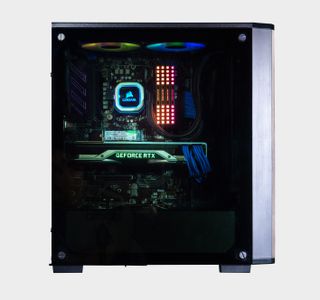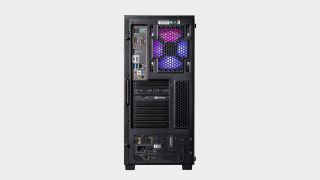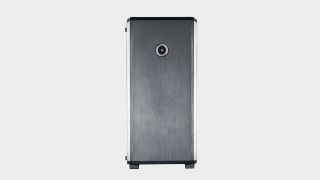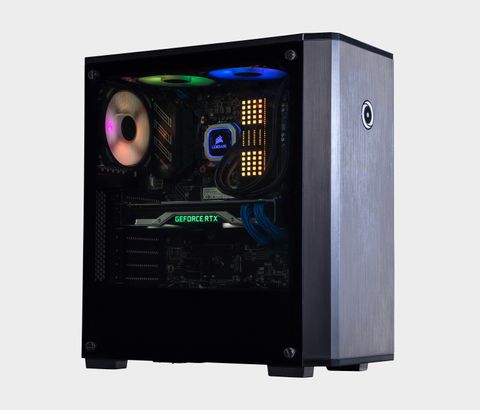Our Verdict
Origin's braincase, now upgraded with Corsair hardware, is a solid testament to the value of pre-built PCs. Extensive customization options, paired with robust new hardware, form a convincing argument for this high-performing, expensive desktop.
For
- Excellent components
- Cool personalization options
Against
- Expensive
- Runs a bit hot
PC Gamer's got your back
Origin was recently acquired by component manufacturer Corsair, and they're eager to show off with their latest Origin Neuron configuration with the Corsair Carbide 175R case—and a smattering of other Corsair parts. Origin is just one of many gaming PC manufacturers out there, and with so many options available, these vendors are in a constant struggle to one-up each other as they attempt to justify the sometimes exorbitant costs associated with their products. This field is occasionally punctuated by a manufacturer with exceptional aesthetics, build quality, and value for the service they offer. The Neuron can be a spendy machine depending on your configuration, but you get what you pay for.
GPU: GeForce RTX 2070 Super 8GB (Overclocked)
CPU: AMD Ryzen 9 3900X 12-Core 3.8GHz (4.6GHz TurboBoost) (Overclocked)
Motherboard: MSI MEG X570 ACE
RAM: Corsair Dominator Platinum 3200MHz (2 X 8GB)
Storage: Corsair MP600 Gen4 PCIe NVMe M.2 SSD 1TB, Seagate FireCuda 2TB SATA HDD
PSU: Corsair 750X RMX Series
CPU Cooling: Origin Frostbyte 360 Sealed Liquid Cooling System
Dimensions: W: 18.9" H: 8.2" L: 17.7"
Weight: 19 lbs.
Warranty: Lifetime 24/7 U.S.-based support and lifetime free labor. 1-year part replacement & 45-day shipping warranty
Along with the Corsair Carbide 175R case, the Origin Neuron configuration we tested uses Corsair RAM and memory, but not one of its AIO coolers, strangely. Origin's proprietary AIO cooler is used in this build instead. While this acquisition does give you the option of using genuine Corsair components in your build, it does have the unfortunate side-effect of limiting your choices of hardware, leaving anyone who isn't necessarily crazy about Corsair's parts stuck with the stock Origin components.
The Carbide 175R case measures 18.9x8.2x17.7 (HWD) and is a versatile mid-tower with a single tempered glass side panel, similar to the previous iteration of the Neuron. Our build came with a single Corsair 1TB MP600 NVMe SSD paired with a 2TB FireCuda HDD for ample storage capacity, and a 2070 Super backed by an AMD Ryzen 9 3900X, as well as 16GB of 3200 Mhz RAM, all of which provided the necessary power to push some serious framerates at 1440p.
Additionally, Origin offers extensive customization options and extras for all of its configurations, running the gamut from sensible to egregious. You can personalize your PC with custom paint jobs, laser etching, or even UV printing for a machine that truly sets itself apart from the pack. Ours came sans the custom paint job, but that didn't make it any less of a good-looking rig.

This Neuron build certainly doesn't disappoint as far as performance is concerned. We stacked our Origin build against our toughest 1440p benchmarks and it wasn't hard to figure out who came out on top. The Neuron hurdled all of our benchmarks with ease and provided excellent 1440p performance across the board. While some thermal stress is to be expected with any desktop while under load, I was mildly concerned by the amount of heat being given off by the Neuron while operating at its peak. While it never approached levels that would put the hardware at risk, even in a well-ventilated area it felt like there was a small space heater underneath my desk at times.
An important note is that our configuration was overclocked out of the box, which certainly contributed to the thermal load as well as the performance. Thankfully, with Corsair's Carbide case and fan configuration, the Neuron was able to keep temps well below 75 degrees Celsius.


Price is easily the largest differentiator in choosing a pre-built vendor. While the gap between building your own PC as opposed to having someone assemble one for you will always be present, it's shrinking rapidly. To put some perspective on this, the combined cost of the parts in this build, if you were to buy them yourself at their current MSRP, is a little over $1,900. The price of the configuration we were sent is a little over $2,600, even with the included coupon code knocking $100 off the price. However, the services provided by Origin here, such as lifetime remote access support and replacement shipping, do help to justify the eye-watering cost.
Not everyone has the time, patience, or technical knowledge to build their own PC, but they still want to bask in the glory that only the church of PC gaming can provide. That's the service companies like Origin offer, and ultimately you're paying for convenience. You can argue until you're blue in the face about the price tag that comes with this capable 1440p desktop, but Corsair components matched with Origin aesthetics is proving to be a killer combo.
Origin's braincase, now upgraded with Corsair hardware, is a solid testament to the value of pre-built PCs. Extensive customization options, paired with robust new hardware, form a convincing argument for this high-performing, expensive desktop.
Alice is PC Gamer's resident peripherals expert and PC parts nut. She's been breaking computers to learn more about them for as long as she can remember, developing a lifelong motto of "instruction by destruction." "Pick up" is her favorite SCUMM verb.

